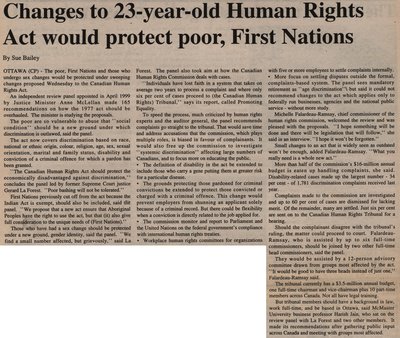"Changes To 23-Year-Old Human Rights act Would Protect Poor, First Nations"
- Publication
- Tekawennake News (Ohsweken, Ontario), 28 Jun 2000
- Full Text
- Changes to 23-year-old Human Rights Act would protect poor, First NationsBy Sue Bailey
OTTAWA (CP) - The poor, First Nations and those who undergo sex changes would be protected under sweeping changes proposed Wednesday to the Canadian Human Rights Act.An independent review panel appointed in April 1999 by Justice Minister Anne McLellan made 165 recommendations on how the 1977 act should be overhauled. The minister is studying the proposals.
The poor are so vulnerable to abuse that "social condition" should be a new ground under which discrimination is outlawed, said the panel.
The act now covers discrimination based on race, national or ethnic origin, colour, religion, age, sex, sexual orientation, marital and family status, disability and conviction of a criminal offence for which a pardon has been granted.
"The Canadian Human Rights Act should protect the economically disadvantaged against discrimination," concludes the panel led by former Supreme Court justice Gerard La Forest. "Poor bashing will not be tolerated."
First Nations previously cut off from the act because the Indian Act is exempt, should also be included, said the panel. "We propose that a new act ensure that Aboriginal Peoples have the right to use the act, but that (it) also give full consideration to the unique needs of (First Nations)."
Those who have had a sex change should be protected under a new ground, gender identity, said the panel. "We find a small number affected, but grievously," said La Forest. The panel also took aim at how the Canadian Human Rights Commission deals with cases.
"Individuals have lost faith in a system that takes on average two years to process a complaint and where only six per cent of cases proceed to (the Canadian Human Rights) Tribunal," says its report, called Promoting Equality.
To speed the process, much criticized by human rights experts and the auditor general, the panel recommends complaints go straight to the tribunal. That would save time and address accusations that the commission, which plays multiple roles, is biased in favour of complainants. It would also free up the commission to investigate "systemic discrimination" affecting large numbers of Canadians, and to focus more on educating the public.
The definition of disability in the act be extended to include those who carry a gene putting them at greater risk for a particular disease.
The grounds protecting those pardoned for criminal convictions be extended to protect those convicted or charged with a criminal offence. This change would prevent employers from shunning an applicant solely because of a criminal record. But there could be flexibility when a conviction is directly related to the job applied for.
The commission monitor and report to Parliament and the United Nations on the federal government's compliance with international human rights treaties.
Workplace human rights committees for organizations with five or more employees to settle complaints internally.
More focus on settling disputes outside the formal, complaints-based system. The panel sees mandatory retirement as "age discrimination"\ but said it could not recommend changes to the act which applies only to federally run businesses, agencies and the national public service - without more study.
Michelle Falardeau-Ramsay, chief commissioner of the human rights commission, welcomed the review and was pleased with the proposals. "I hope something will be done and there will be legislation that will follow, "she said in an interview. "I hope it won't be forgotten."
Small changes to an act that is widely seen as outdated won't be enough, added Falardeau-Ramsay. "What you really need is a whole new act."
More than half of the commission's $16-million annual budget is eaten up handling complaints, she said. Disability-related cases made up the largest number - 34 per cent - of 1,781 discrimination complaints received last year.
Complaints made to the commission are investigated and up to 60 per cent of cases are dismissed for lacking merit. Of the remainder, many are settled. Just six per cent are sent on to the Canadian Human Rights Tribunal for a hearing.
Should the complainant disagree with the tribunal's ruling, the matter could proceed to court. Falardeau-Ramsay, who is assisted by up to six full-time commissioners, should be joined by two other full-time head commissioners, said the panel.
They would be assisted by a 12-person advisory committee drawn from groups most affected by the act. "It would be good to have three heads instead of just one," Falardeau-Ramsay said.
The tribunal currently has a $3.5-million annual budget, one full-time chairman and vice-chairman plus 10 part-time members across Canada. Not all have legal training.
But tribunal members should have a background in law, work full-time, and be based in Ottawa, said McMaster University business professor Harish Jain, who sat on the review panel with La Forest and two other members. It made its recommendations after gathering public input across Canada and meeting with groups most affected.
- Creator
- Bailey, Sue, Author
- Media Type
- Newspaper
- Item Types
- Articles
- Clippings
- Description
- "OTTAWA (CP) - The Poor, First Nations and those who undergo sex changes would be protected under sweeping changes proposed Wednesday to the Canadian Human Rights Act."
- Date of Publication
- 28 Jun 2000
- Subject(s)
- Personal Name(s)
- McLellan, Anne ; Falardeau-Ramsay, Michelle ; Jain, Harish
- Corporate Name(s)
- McMaster University ; Canadian Human Rights Tribunal
- Local identifier
- SNPL003074v00d
- Language of Item
- English
- Geographic Coverage
-
-
Ontario, Canada
Latitude: 45.4168 Longitude: -75.68264
-
- Creative Commons licence
 [more details]
[more details]- Copyright Statement
- Public domain: Copyright has expired according to Canadian law. No restrictions on use.
- Copyright Date
- 2000
- Copyright Holder
- Tekawennake
- Contact
- Six Nations Public LibraryEmail:info@snpl.ca
Website:
Agency street/mail address:1679 Chiefswood Rd
PO Box 149
Ohsweken, ON N0A 1M0
519-445-2954




